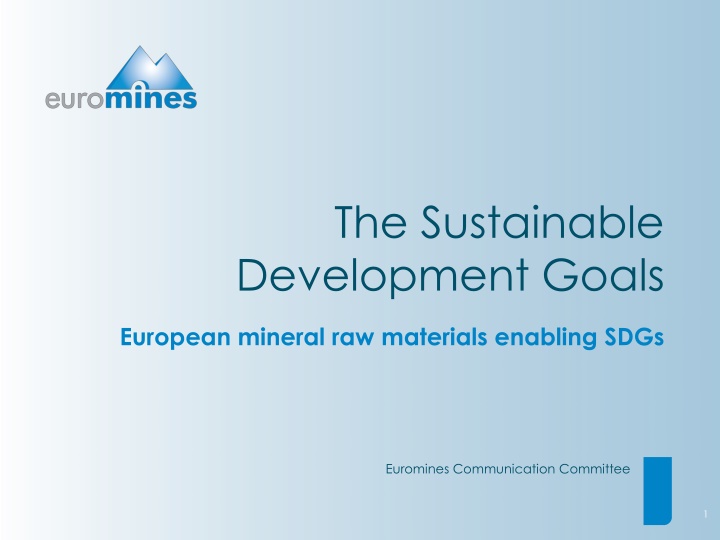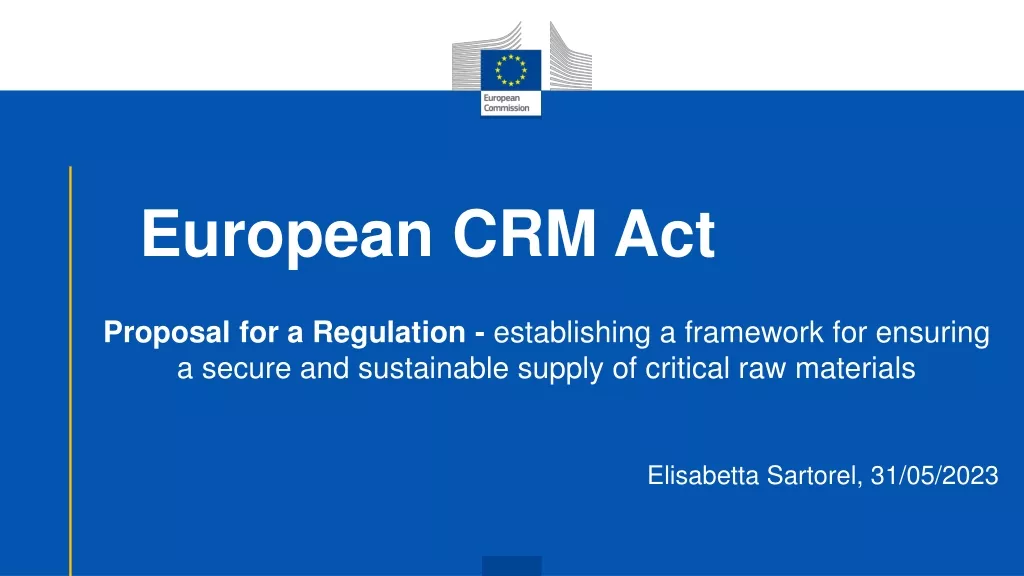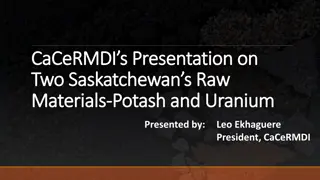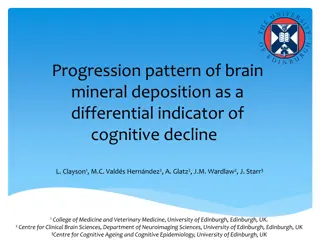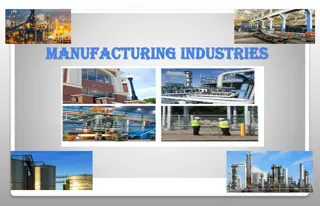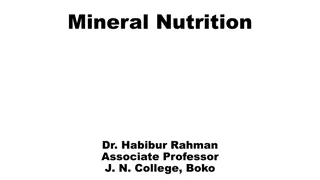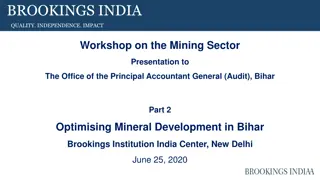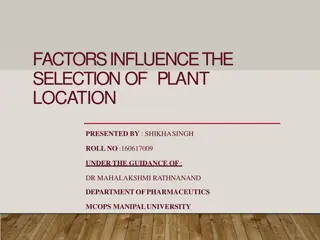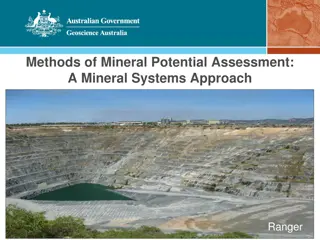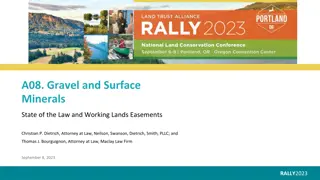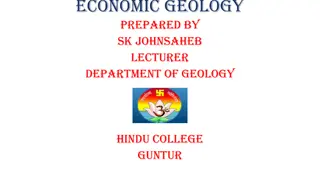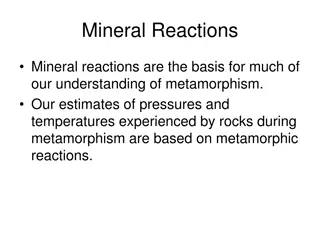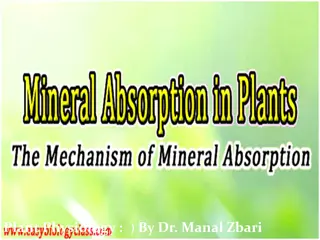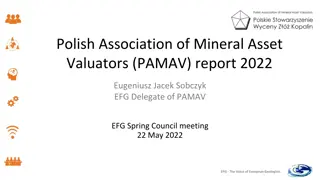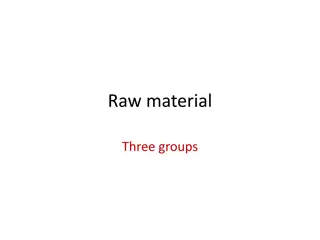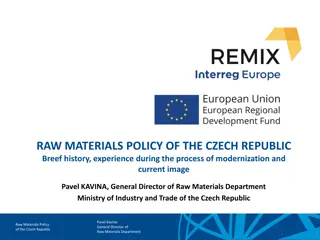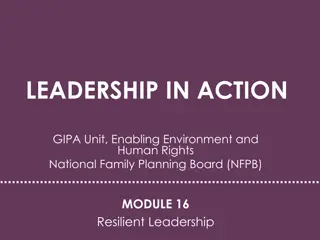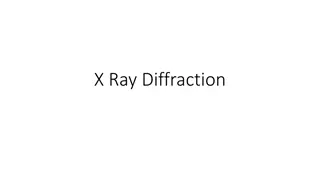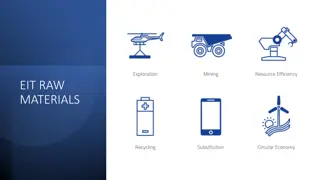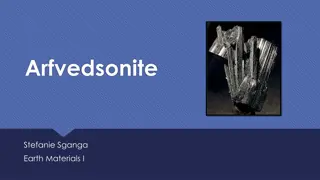European Mineral Raw Materials: Enabling Sustainable Development Goals
The European mineral raw materials industry plays a crucial role in achieving Sustainable Development Goals by addressing issues like poverty, hunger, health, and education. Through responsible mining practices, job creation, and community development, the industry contributes to economic growth while ensuring environmental sustainability and social well-being. By prioritizing people, promoting health and education, and fostering innovation, the sector paves the way for a sustainable future.
Download Presentation

Please find below an Image/Link to download the presentation.
The content on the website is provided AS IS for your information and personal use only. It may not be sold, licensed, or shared on other websites without obtaining consent from the author.If you encounter any issues during the download, it is possible that the publisher has removed the file from their server.
You are allowed to download the files provided on this website for personal or commercial use, subject to the condition that they are used lawfully. All files are the property of their respective owners.
The content on the website is provided AS IS for your information and personal use only. It may not be sold, licensed, or shared on other websites without obtaining consent from the author.
E N D
Presentation Transcript
The Sustainable Development Goals European mineral raw materials enabling SDGs Euromines Communication Committee 1
SPIRITUAL SDG Pyramid PEOPLE will be always the basis (and the reason) of Sustainable Development. The first 10 goals align with people and social issues and represent the foundation that should be covered before the next five goals on ecological challenges and two final spiritual goals on peace and partnership can be achieved. ECOLOGICAL PEOPLE www.euromines.org European Association of Mining Industries, Metal Ores & Industrial Minerals www.euromines.org 2
The European mineral raw materials European Association of Mining Industries industry enabling SDGs
1. No Poverty While widespread poverty is not a major problem in Europe, the mining industry s role in fostering positive economic growth, job creation and skills development helps ensure this will continue in Europe. www.euromines.org European Association of Mining Industries, Metal Ores & Industrial Minerals www.euromines.org 4
2. Zero Hunger Mining, besides economic growth and job creation, can provide soil nutrients that increase yields such as potash, zinc and phosphorus, and mining companies work to manage water in ways that protect clean water sources and don t inhibit its access for agricultural irrigation. Widespread hunger is not a current major problem in Europe, but a growing population will require increased food production in the future. www.euromines.org European Association of Mining Industries, Metal Ores & Industrial Minerals www.euromines.org 5
3. Good Health and Well-Being Safe and healthy working conditions are a top priority in the European mineral raw materials industry. Companies also extend workforce health and wellbeing programmes to local communities and contractors ensuring there are positive effects on people in the surrounding areas. Mineral raw materials always contributed decisively to human evolution and wellbeing and will continue to do it. www.euromines.org European Association of Mining Industries, Metal Ores & Industrial Minerals www.euromines.org 6
4. Quality Education While quality education is accessible to all European citizens, there is a need for wider society learning about the importance of minerals and metals. The sector is involved in specific school programmes, apprenticeships, scholarships and graduate programmes. Mining operations provide a range of employment opportunities, invest in local trainings or extend workforce education and training to local communities and contractors. www.euromines.org European Association of Mining Industries, Metal Ores & Industrial Minerals www.euromines.org 7
5. Gender Equality Most mining companies in Europe have clear statements supporting gender equality, women filling visible leadership roles, processes for ensuring a safe workplace for women, as well as official processes for recruiting and retaining female employees. www.euromines.org European Association of Mining Industries, Metal Ores & Industrial Minerals www.euromines.org 8
6. Clean Water and Sanitation Mining companies have a responsibility to ensure their operations do not result in contaminated water supplies or inhibit access to clean water. Sound water practices are regulated at the EU and national levels, and companies collaborate with local experts to accurately measure, analyse and test water supplies. www.euromines.org European Association of Mining Industries, Metal Ores & Industrial Minerals www.euromines.org 9
7. Affordable and Clean Energy European mining provides the raw materials needed for the products that produce clean energy, such as steel and concrete for wind turbines and silicon, gallium, lithium and cobalt (among many others) for solar panels and batteries. Mining companies across Europe are also working to run their operations more efficiently, using more clean energy sources and reducing their energy consumption. www.euromines.org European Association of Mining Industries, Metal Ores & Industrial Minerals www.euromines.org 10
8. Decent Work and Economic Growth Mining companies continuously collaborate with government and other companies and organisations to enhance broader economic development opportunities and invest in various ways that host communities can become economically productive during and beyond the life of a mine, being normally the indirect impact of a mine 4 or 5 times bigger than the direct one. Mining itself is the only economic activity that generates wealth and employment in several social depressed regions in Europe. www.euromines.org European Association of Mining Industries, Metal Ores & Industrial Minerals www.euromines.org 11
9. Industry, Innovation and Infrastructure European mining companies are a global leader of innovation and the supplier of raw materials used for infrastructure development and in downstream industries. The sector is constantly developing stronger, more durable and more efficient materials for these purposes. The European raw materials industry innovation and high- tech developments also contribute to very important positive impacts in the continent and globally. www.euromines.org European Association of Mining Industries, Metal Ores & Industrial Minerals www.euromines.org 12
10. Reduced Inequalities Companies combat inequalities by establishing baseline statistics on possible existing ones and then collaborating with partners to implement targeted investments and training opportunities focusing on marginalized populations. www.euromines.org European Association of Mining Industries, Metal Ores & Industrial Minerals www.euromines.org 13
11. Sustainable Cities and Communities The industry contributes to sustainable cities by supporting development of infrastructure, involving all stakeholders in land use planning, reclaiming mined land, for example into green spaces or heritage sites, and by producing innovative products such as concrete with higher CO2 capture or more durable steel that has a longer product life. In the past, today and in the future it is impossible to have sustainable cities and wealthy communities without mineral raw materials. www.euromines.org European Association of Mining Industries, Metal Ores & Industrial Minerals www.euromines.org 14
12. Responsible Consumption and Production The European mineral raw materials industry has made Circular Economy one of its top priorities, working to reduce and reutilise waste, transforming it into a resource and improving efficiency of raw materials usage and improving the recyclability of products made from mined minerals and metals. Eco-efficient processes and products are also one of the priorities of the sector, reducing energy and material consumption. www.euromines.org European Association of Mining Industries, Metal Ores & Industrial Minerals www.euromines.org 15
13. Climate Action Mineral Raw Materials will be decisive for a transition to a Low-Carbon society. The European mineral raw materials industry also has adopted ambitious carbon management policies and targets. Work to reduce, eliminate and offset emissions in operations includes a wide variety of strategies such as transitioning to electric vehicles, utilising advanced exploration technologies and optimising ore extraction. www.euromines.org European Association of Mining Industries, Metal Ores & Industrial Minerals www.euromines.org 16
14. Life Below Water The European mineral raw materials industry sector contributes to ocean sustainability by understanding the dependence of local communities on marine resources, identifying marine- related impacts and mitigation strategies, and contributing to the protection and conservation of the oceans and seas. www.euromines.org European Association of Mining Industries, Metal Ores & Industrial Minerals www.euromines.org 17
15. Life on Land The European mineral raw materials industry sector is working to improve operations so that land is disrupted as little as possible. Additionally, before a mine is opened in the EU, the mining company must have a plan for restoration of the land impacted by operations, many of which include offsetting any losses or even increasing biodiversity, reclaiming land for agricultural or other purposes and creating parks and greens spaces. www.euromines.org European Association of Mining Industries, Metal Ores & Industrial Minerals www.euromines.org 18
16. Peace, Justice and Strong Institutions The European mineral raw materials industry is peaceful and beneficial to all our citizens. The European mining companies seek to secure supply of raw materials in a transparent way through production, reducing our dependency on imported raw materials from regions where these issues persist. www.euromines.org European Association of Mining Industries, Metal Ores & Industrial Minerals www.euromines.org 19
17. Partnerships for the Goals The European mineral raw materials industry sector is among the most sophisticated partners in addressing a range of sustainable development challenges. The mining companies are working to share these experiences more broadly and encourage further engagement in partnerships to achieve collaborative progress on the SDGs. www.euromines.org European Association of Mining Industries, Metal Ores & Industrial Minerals www.euromines.org 20
The European mineral raw materials European Association of Mining Industries industry contribution to the sustainable development pillars
Economic sustainability European mineral raw materials industry contributes to the economic sustainability by: Staying financially strong in order to be an innovative and responsible sector and contributing to prosperity. Maintaining high return on equity. Having a healthy net debt/equity ratio. Consistently seeing results. Maintaining high ordinary dividends. www.euromines.org European Association of Mining Industries, Metal Ores & Industrial Minerals www.euromines.org
Social sustainability European mineral raw materials industry contributes to the social sustainability by: Maintaining secure and attractive workplaces and exert positive influences on our business partners and our immediate environment. Reducing accidents. Working to improve gender equality. Working to increase diversity. www.euromines.org European Association of Mining Industries, Metal Ores & Industrial Minerals www.euromines.org
Environmental sustainability European mineral raw materials industry contributes to the environmental sustainability by: Being resource-efficient and environmentally efficient. Reducing carbon emissions. Reducing energy intensity. Reducing discharges to water. Reducing emissions to air. www.euromines.org European Association of Mining Industries, Metal Ores & Industrial Minerals www.euromines.org
Key Performance Indicators of the European Association of Mining Industries European mineral raw materials industry linked to the SDGs
Occupational health and safety Mining and quarrying companies are significant employers in Europe, but as employers in an industry that carries inherent risks, these companies have a great responsibility concerning work environment, employment terms and health and safety. Regulations on work environment policies, objectives and management systems are governed by EU and national legislation. Work environments and contractors are monitored by assessing performance against established objectives and are reported in the HR department s systems. Companies aim for stimulating and sound psychosocial work environments characterised by diversity, equality and non-discrimination. Collaboration between employees, managers, health and safety officers, support organisations, clients and suppliers is critical in preventing and eliminating occupational health and safety risks, creating safe mining conditions, and managing work-related injuries and unsafe situations. Each company must have plans in place for managing various types of crises, as well as regular training activities to prepare for such events, however unlikely. To make plans for safety a reality, safety culture is also widely spread across the sector, aiming to reduce the number of accidents through systematic efforts relating to the work environment and health. www.euromines.org European Association of Mining Industries, Metal Ores & Industrial Minerals www.euromines.org
Compliance with laws, regulations and permits A large number of EU and national regulations that cover the mining and ore processing industry must be complied with before, during and after the production phase. The regulations cover areas such as social impact, environmental impact and the work environment. Complying with legal requirements and conditions outlined in permits is imperative. Monitoring frequent updates in regulations is an important part of adherence. The sector conducts sustainability work encompassing a wider range of requirements than the legislation for its own environmental objectives, environmental management systems implemented and development work. A major challenge for the European minerals industry is the lack of legally certain and efficient permit processes. This is hindering economic and environmental development. Permit reviews need to be made more efficient and predictable for everyone involved. www.euromines.org European Association of Mining Industries, Metal Ores & Industrial Minerals www.euromines.org
Greenhouse gas emissions and energy use / 1 Mineral Raw Materials will be decisive for a transition to a Low-Carbon society. Energy management system All companies have an energy policy and many are certified or in the process of being certified according to energy management system ISO 50001. Energy efficiencies and BATs Reducing energy consumption and carbon emissions are sector-wide objectives by applying BATs. Since energy accounts for a considerable part of the companies costs, it is important that the companies improve their energy efficiency in order to limit both costs and environmental impacts. www.euromines.org European Association of Mining Industries, Metal Ores & Industrial Minerals www.euromines.org
Greenhouse gas emissions and energy use / 2 Switching energy sources Most companies in the sector are dependent on national grids. However, an increasing number have started to source other forms of energy or have invested in their own alternative energy supplies where currently feasible. The most sustainable and energy-efficient option is to be chosen as far as possible. Utilising heat Many companies are using waste heat from processes for heating and selling waste heat that is not used internally to heating networks in neighbouring communities. Research into new technologies and processes Many mining companies are involved in research programmes Research into carbon capture and utilisation of industrial synergies Some mineral processing emits CO2as part of the chemical reaction and therefore reduction is not possible; www.euromines.org European Association of Mining Industries, Metal Ores & Industrial Minerals www.euromines.org
Supplier management Companies in the sector are major buyers of goods and services that in certain geographic areas and segments are subject to greater sustainability risks, mainly in terms of environmental impact, employment terms and human rights. Most companies manage the work through risk-based assessment, requirements in the form of a Supplier Code of Conduct, dialogue, training and monitoring. All companies comply with the EU directive on conflict minerals. www.euromines.org European Association of Mining Industries, Metal Ores & Industrial Minerals www.euromines.org
Local emissions and impact on air, water and land Mines, industrial areas and urban transformation inherently utilise land and impact the look of the landscape as well as biodiversity. For example: Some processing requires large amounts of water and energy. Emissions to air can have a regional impact on biodiversity, other natural resources and ecosystem services. Diffuse dust from industrial areas. A basis for the management of environmental efforts is provided by environmental and energy policies and guidelines on land use. One element of the environmental management system certified by ISO 14001, involves risk analyses that apply the precautionary principle in order to prevent adverse environmental consequences. All operations must comply with laws and regulations and have the necessary permits. This is followed up through self-monitoring programmes. Mining companies also conduct follow-up in connection with reporting on sustainability objectives and annual environmental reports compiled for regulatory authorities. Most companies also have an incident reporting system where all environmental events are European Association of Mining Industries, Metal Ores & Industrial Minerals reported. www.euromines.org www.euromines.org
Products and solutions that are long-term sustainable Through the ages, social development has been linked to the use of metals and minerals. Metals are not single-use products. They are elements that can be reused time and time again. They can be reused and recycled. Many minerals can be recovered and reused or, in the form of their downstream products, be reused and recycled. High volume uses of minerals often have long life spans of products and thus contribute to long-term sustainability. Many metals and minerals contribute to sustainability of downstream industries and products. However, reuse and recycling alone is not enough to meet the demand for raw materials and primary raw materials will be an integral part of circularity. www.euromines.org European Association of Mining Industries, Metal Ores & Industrial Minerals www.euromines.org
Ore base and ore yields A mineral resource is an accumulation of minerals which may be able to be commercially extracted. A mineral reserve is the part of the resource that can be profitably extracted. Good knowledge of mineral resources and reserves is essential for significant and long-term investment decisions, the size and quality of the minerals being of crucial importance for product quality, production volumes and costs. Knowledge of the mineral resources and reserves is based on exploration work. Exploration involves mapping and obtaining geological knowledge by means of surveys and test drilling. Exploration takes place both in existing mines and in new areas. The key to successful exploration is to improve geological knowledge and access to land areas potentially containing minerals. www.euromines.org European Association of Mining Industries, Metal Ores & Industrial Minerals www.euromines.org
Human rights The companies social responsibility goes beyond what happens internally within a company and extends out to local communities, supply chains and customers. Based on risk analysis, internally and for the whole value chain, the companies are working to effectively identify, respect and manage risks associated with direct and indirect negative impacts on human rights. Companies have zero tolerance of discrimination and harassment and have established processes for dealing with such incidents. Companies are also working to increase diversity and non- discrimination. www.euromines.org European Association of Mining Industries, Metal Ores & Industrial Minerals www.euromines.org
Recruitment and skills supply All employees, with their different skills, backgrounds and life experiences, are part of a company s diversity and contribute to attractive workplaces. Attracting and retaining individuals with the right skills is key to each company s long-term competitiveness. To be an attractive employer, companies must offer professional challenges, broad career paths and personal development. The work is governed by national legislation and regulations on the work environment, the companies work environment policies, the management philosophy, diversity plans, and staff policies. www.euromines.org European Association of Mining Industries, Metal Ores & Industrial Minerals www.euromines.org
Resource-efficient use of raw materials European natural resources are mined from deposits in accordance with environmental permits. For long-term operations, companies must secure mineral reserves and mineral resources. www.euromines.org European Association of Mining Industries, Metal Ores & Industrial Minerals www.euromines.org
Cooperation with trade unions Cooperation between employers and trade union representatives and health and safety representatives is aimed at compliance with various laws. The aim of the collaboration is to create the conditions for a positive work climate, good health and a work environment where influence, participation and development are rights for all employees. www.euromines.org European Association of Mining Industries, Metal Ores & Industrial Minerals www.euromines.org
Interaction with local communities The companies of the sector can have a significant impact on local communities as a major employer and business in the region, and through initiatives for local community development. Companies contribute to attractive communities in the operating locations, something they see as strategically important for being able to retain skilled employees and attract new employees. Principles for interaction with local communities are based on respect and on open and transparent dialogue. This interaction takes place both directly and indirectly, for example via partnerships with suppliers, sponsorship, outdoor ventures and educational initiatives. www.euromines.org European Association of Mining Industries, Metal Ores & Industrial Minerals www.euromines.org
